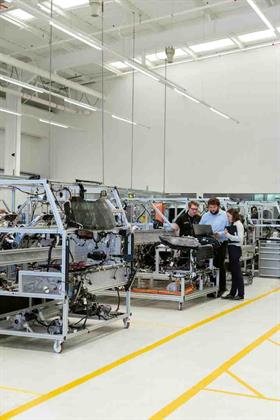
Odoo ERP Tailoring for Chemical Manufacturing to Manage Formulas, Compliance & Plants
July 10, 2025
What is Odoo ERP Tailoring in the Context of Chemical Manufacturing?
Standard ERP systems are frequently unable to meet the specific requirements of the chemical manufacturing sector, including batch formulation, regulatory compliance, quality assurance, and multi-site plant operations. Customised ERP systems can help with it. Odoo ERP tailoring is the process of modifying and customising Odoo's open-source platform to satisfy the precise compliance frameworks and business procedures needed in the chemical production industry.
Developing formula-based production workflows, integrating safety data sheets, automating multi-level BOMs, and aligning manufacturing procedures with industry standards such as REACH, OSHA, or GHS are all examples of tailoring. Chemical firms can go beyond simple ERP use with an odoo customization service and build an environment that fits their batch traceability, quality standards, and product chemistry. Increased process visibility, increased trust in compliance, and the capacity to scale ERP adoption with operational growth are the outcomes.
Key Modules and Functionalities Enhanced Through Odoo Customization Service
Manufacturing Module: This module is customized to support formula-based production, by-products, and batch manufacturing. Tailoring allows precise tracking of chemical compositions and yields, with automatic adjustments for variations in raw materials.
Quality Management: Odoo customization enables detailed quality control at each production stage. It includes custom inspection plans, sampling procedures, and deviation tracking, essential for regulated industries like chemicals.
Inventory Management: Customized inventory tracks chemicals by lot, expiry, and hazard class. It includes safety stock rules, real-time visibility across locations, and secure storage tracking for hazardous materials.
Compliance Management: Through customization, Odoo integrates documentation like MSDS, GHS labels, and audit trails. It automates regulatory reporting and maintains compliance logs aligned with global standards.
Formulation and R&D: Custom R&D modules allow development of new chemical formulas with costing, testing, and version control. Integration with BOM ensures direct implementation in manufacturing.
Plant Maintenance: Customized plant maintenance tracks equipment health, schedules predictive maintenance, and logs breakdowns ensuring minimal downtime and safe production environments.
Why Chemical Manufacturers Need Specialized Odoo Customization Services
Formula Management: Chemical firms need accurate handling of complex formulations, ingredient variations, and scalable batch sizing something a customized Odoo ERP manages efficiently.
Regulatory Compliance: Customized systems ensure automatic documentation of compliance data, like GHS and REACH regulations, which are mandatory in chemical production.
Real-Time Traceability: Full batch traceability is essential. Custom Odoo features enable tracking of raw materials and finished goods from procurement to dispatch.
Safety Protocols Integration: Integrating chemical safety standards (SDS, PPE tracking, hazard alerts) within ERP workflows is made possible through expert customization.
Multi-Plant Operations: Chemical manufacturers operating in multiple plants require centralized control and local flexibility achievable with customized multi-site configurations.
Scalable Manufacturing Process: With growth, manufacturing workflows become complex. Customization allows adding new formulations, production lines, and automation features without disruption.
Costing Accuracy: Accurate costing of chemical products needs advanced calculation logic, including waste factors and energy use enabled through tailored ERP modifications.
Operational Challenges Solved with Odoo Customization in Chemical Plants
Complex Batch Production: Standard ERP lacks the depth needed for batch-specific formulations. Odoo customization allows detailed batch processing aligned with regulatory and production needs.
Hazardous Material Handling: Generic systems don’t support hazard class segregation, chemical labeling, or storage protocols. Customization helps enforce these critical safety standards.
Regulatory Documentation: Manual handling of compliance reports and certifications leads to errors. Tailored Odoo automates GHS labeling, SDS management, and audit readiness.
Multi-Level BOM Complexity: Chemical processes often involve multi-level BOMs with substitutes and co-products. Customization enables dynamic BOM structuring and seamless execution.
Inefficient Quality Control: Without customization, quality testing is limited. Tailored systems allow test triggers at multiple stages with specifications, tolerances, and deviation alerts.
Inconsistent Data Synchronization: From lab data to plant execution, disconnected systems cause delays. Customized Odoo ensures unified, real-time data flow between departments.
Downtime Due to Maintenance Lapses: Manual maintenance logs are error-prone. Odoo customization includes predictive maintenance, reminders, and failure tracking to reduce plant downtime.
How Investing in Odoo Customization Services Supports Scalable Plant Operations
ERP systems must adapt to the changing needs of chemical manufacturing facilities, from research and development to mass production. Basic tools may be provided by a typical ERP, but the customised strategy is what really maximises efficiency. The adaptability of a customised ERP turns into a long-term strategic advantage when production processes include volatile substances, stringent regulations, and regular reformulations. Because of Odoo's modular architecture, businesses can grow while keeping supplier networks, production schedules, and quality standards clear.
Manufacturers can integrate third-party lab systems, progressively implement automation, and modify reporting formats to meet international requirements by utilising an odoo customization service. The system can change in parallel with plant expansions or product line diversifications without necessitating a completely new ERP investment. In addition to lowering risk and expenses over time, this scalability gives chemical businesses the freedom to innovate while keeping control over their core business.



















